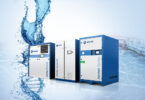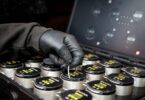Water monitoring is essential to ensuring water quality, whether for drinking or industrial uses. However, traditional approaches are often expensive, time-consuming and don’t empower the end user with information they can act upon.
We spoke with Sense4elements CEO Mario Boss to find out how digital technology is changing the game.
Tell us about your company
Sense4elements develops and sells smart and digital measurement technology for industrial applications and systems. Our goal and motivation is to combine excellent hardware and flexible software with predictive analytics in order to simplify and automate water monitoring and documentation, in either a mobile or stationary application.
Why is water monitoring important?
Water is the basis of all life – plants, animals and humans – making it the most precious resource we have on earth, even more so in the face of climate change and other stressors on our water supply.
The monitoring of water is extremely important so that early and targeted intervention can be taken, especially in industrial applications, and thus, problems can be remedied as quickly as possible.
The reaction time is also decisive, so that harmful pollutants, germs, bacteria, etc. are isolated and eliminated and are not re-introduced into internal processes or discharged into the water cycle.
What are some of the contemporary challenges impeding the provision of clean water globally?
For the provision of clean water, suitable procedures, processes and technical systems for cleaning, monitoring, storage, distribution must always be applied.
Bottlenecks for this are the same around the world, such as the low availability of well-trained personnel, lengthy and complicated manual procedures, as well as correspondingly complex and mostly maintenance-intensive measurement and system technology.
How could current approaches to water monitoring be improved?
In my opinion, smart digital technology is the most effective way to reduce the cost, time and labor associated with current water monitoring practices.
Currently, monitoring is still largely analogue and is usually personnel-dependent, as well as extremely time-consuming. The resulting time delays not only affect the efficiency of industrial plants, but also directly degrade water quality.
With manual processes, it is also much more difficult to identify and capture savings, because digital key indicators for process and operational optimisation are usually still missing.
How can emerging intelligent technologies such as AI, IoT and big data help?
We integrate IoT and big data into our products and applications to combine it with predictive services, as a future-oriented and value-adding tool for our customers.
The point is that in the future, significantly more measurement parameters will be recorded digitally in order to derive customer-specific analyses and forecasts in real time.
Our customers benefit from the fact that by integrating additional water parameters and local weather data, upcoming tasks, and important measures in terms of water quality can be better estimated and planned.
What is your organisation doing?
Sense4elements offers a global software platform combined with excellent digital measurement technology for cross-industry applications in the field of wastewater and waste treatment.
Our products and solutions contribute to increasing global water availability and healthy biological fertilisation of agricultural soils. From an economic point of view, we reduce time and cost-intensive activities that our customers used to depend on.
What are your hopes for the future?
We envision a modular design of water treatment plants, with standardised data interfaces, which would enable every instrument manufacturer and plant technician and provider of operating software systems to be able to offer their solution.
With this approach, every supplier of measuring instruments, software, etc. would be able to concentrate on their best products, constantly expand them and thus also reduce production costs.
This would put the daily applications and challenges of different customers in the foreground, whereby the application decides which mix of suppliers’ products would be most suitable.
Do you have an article or video that you would like to contribute? Submit your contribution here or keep up to date with the latest news from the water industry and wastewater industry by subscribing to our weekly newsletter







